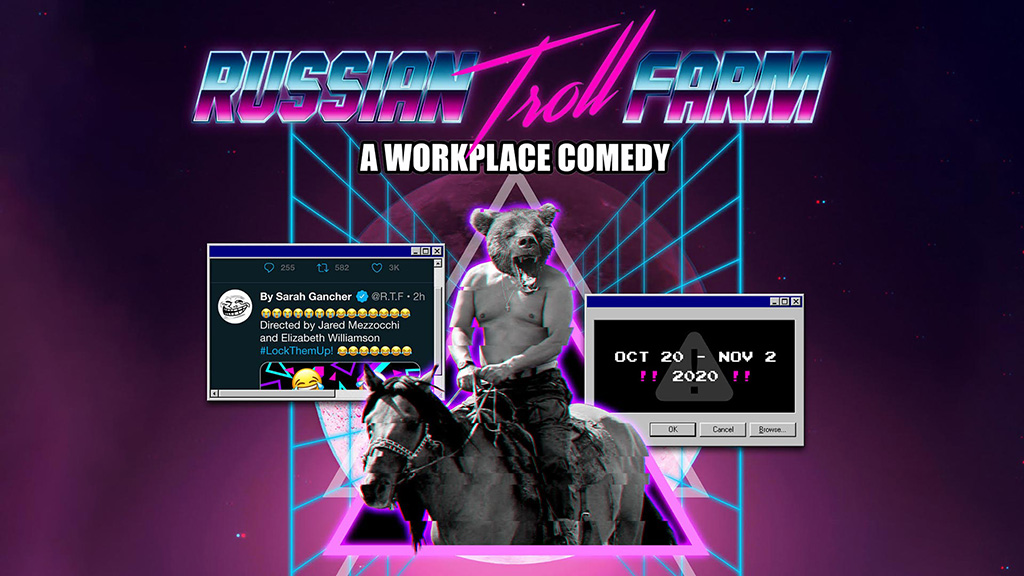 TheatreSquared was awarded a National Theatre Company Grant by the American Theatre Wing in 2011, and now adds a prestigious 2023 Obie Award to the shelf. (Courtesy)
TheatreSquared was awarded a National Theatre Company Grant by the American Theatre Wing in 2011, and now adds a prestigious 2023 Obie Award to the shelf. (Courtesy)When the list of the 66th Obie Award recipients was released on Feb. 27, a name very familiar to Northwest Arkansas theater audiences appeared among the winners: Fayetteville’s own TheatreSquared was awarded a citation for Best Digital+Hybrid+Virtual Production for their mid-pandemic virtual staging of Sarah Gancher’s “Russian Troll Farm” in 2020.
“It’s the highest honor for off-Broadway, and off-Broadway has some really, really big theaters, really giant venues,” says Gancher. “Looking at the list of the other people that were honored, I was gobsmacked. This is an incredible honor to be on a list with these artists—these are the people who are making the most interesting work in the country right now. It’s beautiful to have our names on a list next to people who are literal heroes and inspirations, and I’m just very grateful to TheatreSquared for making that happen.”
“This whole thing was really a surprise,” notes T2’s Director of New Works Dexter Singleton. “[In 2020, we] were all in survival mode and trying to stay active. Martin had made a commitment to keep people employed, and we were just trying to survive. Now people look at this show as something that was so innovative for the entire industry. It’s just amazing that we were able to find something so wonderful and create something that people used as a model throughout the pandemic.”
T2 Artistic Director Bob Ford says Gancher had been on T2’s radar long before the pandemic shut down theaters around the world.
“I love Sarah’s writing — it’s funny, edgy, and relevant,” says Ford. “We had invited her to develop another play at the Arkansas New Play Festival in 2020, having met her through our friends at the Women’s Project, a theater in New York. At some point, I was on a call with her, and it had become clear that the festival workshops and readings would have to be streamed. She said, ‘Hey, I’ve got another piece that I actually think would work even better online. It’s about how the Russians hacked the 2016 election on the internet.’ We jumped in with both feet.”
Gancher wrote “Russian Troll Farm” in the years following the 2016 U.S. presidential election, as reporters started publishing stories about how much influence Vladimir Putin had on its outcome.The result is a clever mash-up of workplace comedy and political satire, with a dash of romance thrown in. In the summer of 2020, Gancher says, her hopes that the timely and trenchant play would be produced before the election that fall were dashed.
“I thought, ‘Oh no, this is a play that is so important for everybody to see before the election. These [online trolls] were playing people on both sides of the political spectrum. They were trying to get everybody more radicalized—push the right more right, push the left more left, make people feel as if they can’t talk to each other and that their compromise isn’t possible, and that cooperation is not possible, and that democracy is impossible. I just thought, ‘If I can make people, whoever they are, think about how they’re being influenced when they go into their feed? That’s something that’s important for me to do before the 2020 election.’ When the pandemic hit, I thought, ‘No one is ever going to see this play. This play is dead.’”
 Sarah Gancher’s “Russian Troll Farm” is a political satire/workplace comedy mash-up that imagines life in a Russian facility hard at work dividing Americans prior to the 2016 election. (Courtesy)
Sarah Gancher’s “Russian Troll Farm” is a political satire/workplace comedy mash-up that imagines life in a Russian facility hard at work dividing Americans prior to the 2016 election. (Courtesy)The person responsible for its resuscitation, say Ford, Singleton and Gancher, is Jared Mezzocchi, who co-directed the show with Elizabeth Williamson. Mezzochhi, says Gancher, asked her if she had a play appropriate for an online project. His idea was not to stream a conventional play for online viewing—he wanted a play that was designed to be viewed online. Gancher says she told him at first that “Russian Troll Farm” would be a bad candidate.
“There’s there’s a big plot point that hinges on physical contact, and I said, ‘Maybe I could rewrite it,’ and he said, ‘No, don’t do that—what’s a way we could make this happen?’”
“There were a lot of people doing online theater at that time, but everybody was sort of trying to have this attitude like, ‘We can’t be together in person. And we wish we were together in person. And it’s so sad that we’re not together in person, but this is the next best thing, and I guess we’ll just try to get as close as we can to that experience.’ And that’s actually not what we were doing. I don’t want this to sound pretentious, but this is just an accurate description of what it felt like: It felt like we were inventing a new art form. It felt like this wasn’t quite theater, but it’s kind of theater. It’s kind of live TV. It’s kind of live filmmaking. It’s some sort of combination of all of these things together. And nobody in this group knew how to make it yet, because nobody had ever made anything like this before. It felt really thrilling, because we had to invent not only ‘What is this thing?’, but also, ‘What’s the process for making this?’”
Gancher approached TheatreSquared about producing the project, because of her previous contact with them. She also has a close, personal relationship with Arkansas: her mother was born in Fort Smith and much of her family still lives there. T2 was quick to sign on, as were two other producing partners—the Civilians, a New York-based company, and TheatreWorks Hartford in Connecticut.
“The Russian troll farms basically exist, and act, in the online world — so it was a perfect fit,” says Ford. “But Jared Mezzocchi was key. He’s a magician. He fooled us into thinking that these actors were all in the same space together—be it their office, a bar, an apartment—when in fact they were isolated in their apartments all across New York City. He utterly erased the lines between those turgid, rigid Zoom boxes. And Elizabeth Williamson, who co-directed, did a superb job with the acting, deepening the stakes for the characters, helping the actors carve out these steep relationship arcs.”
 When Artistic Director Bob Ford, General Manager Shannon Jones, and Executive Director Martin Miller got the opportunity to try something new and daring in the midst of the pandemic, they jumped right in—and the result was a prestigious Obie Award. (Courtesy)
When Artistic Director Bob Ford, General Manager Shannon Jones, and Executive Director Martin Miller got the opportunity to try something new and daring in the midst of the pandemic, they jumped right in—and the result was a prestigious Obie Award. (Courtesy)Everything was done virtually—each individual actor rehearsed and performed in their own apartments, where filming equipment, props and costumes arrived via mail. The show was hailed as a groundbreaking production, forging a new path of possibilities in the middle of a global pandemic. Ultimately it would run until the beginning of 2021 and garnered national press on NPR’s “All Things Considered”, in the pages of the New Yorker and—most impressively—showed up in the New York Times as both a Critic’s Pick and one of the “Best Shows of 2020.”
“A lot of people praised us for [Russian Troll Farm], and it felt great — we were really a leader, industry-wise,” says Singleton. “That was really the start of the theater being catapulted to a national level.”
In fact, online offerings like “Russian Troll Farm” and “The Half-Life of Marie Curie” meant people all over the world could stream T2’s shows. As a result, its national recognition grew — a miracle at a time when other institutions were shuttering their doors. Research shows that the performing arts sector was one of the worst hit by the pandemic, with financial losses approaching $18 billion. By mid-2020, 63% of artists were unemployed, and 95% reported losing creative income. Because Ford, Executive Director Martin Miller, General Manager Shannon Jones, and Director of Production Kat Wepler pivoted so quickly to streaming their productions using professional equipment, T2 never shut down during the pandemic, and was able to survive the storm without laying off any permanent employees.
One possible secret to their success?
“Surround yourself with brilliant, resourceful folks who don’t know the meaning of ‘No’,” says Ford.
“There were a bunch of larger theaters that were also interested in coming in and being a part of the collective,” says Gancher. “Big, big theaters in New York that ultimately passed. I’ve had so many of the people from those theaters since then saying, ‘I’m still kicking myself that we didn’t get in on it.’ But they didn’t have the vision. And guess who did? Martin and Bob.”

